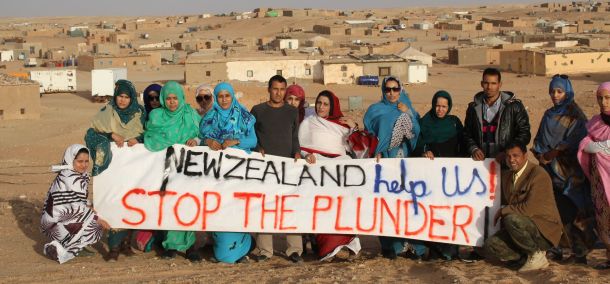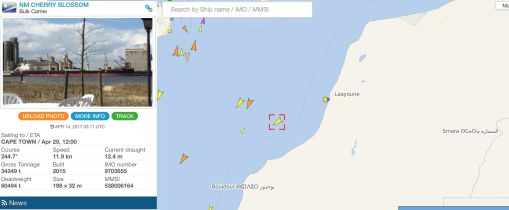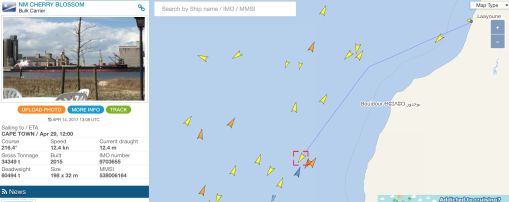
A bulk vessel was Tuesday this week detained in the South African port of Port Elizabeth for carrying phosphate rock plundered from occupied Western Sahara.
High resolution image of the above photo can be downloaded here. Picture by Saharawis Against the Plunder.
The vessel NM Cherry Blossom is stuck at anchor 4 kilometers off Port Elizabeth, South Africa, not allowed to continue on its journey to New Zealand.
The liberation movement of Western Sahara, Frente Polisario has thus managed to intercept and detain the shipment carrying 5,2 million USD worth of conflict minerals destined for the New Zealand agriculture industry. The phosphate is being exported by a Moroccan state-owned company in the territory which is under foreign Moroccan occupation, and used to produce fertilizers. The cargo is estimated at 54.000 tonnes.
New Zealand was in 2016 the second biggest importer of the conflict mineral, according to the report P for Plunder 2016, published by WSRW last week.
The story of the detained cargo was covered by Reuters on Wednesday evening.
NM Cherry Blossom – was originally scheduled to arrive in Bluff, New Zealand, on 30 May 2017 according to the website of Southport. The vessel is owned by the Greek company AM Nomikos Transworld Maritime (www.amnomikos.net, tel +30 210 615 5200, +30 210 619 8220). Its current location can be tracked on the website Marinetraffic.
The vessel stopped over in South Africa for provisioning. And it was during those few hours that authorities from Western Sahara initiated legal proceedings against the vessel. A court order resulted in the detention of the cargo aboard the ship.
The Saharawi people and their representative organization, has long protested the illegal mining and export of phosphate rock from that part of Western Sahara under armed occupation since 1975 by Morocco. The trade has continued despite the commitment of the United Nations in 1991 to oversee a self-determination referendum for the people of Western Sahara, a territory dealt with by the UN as Africa’s last colonial issue.
"The export of these non-renewable resources from a place under armed occupation is a violation of well-settled principles of international law. It is a war crime", stated Kamal Fadel, the Saharawi representative for Australia and New Zealand.
"The resources need to stay in the ground until the Saharawi people are allowed the basic commitment of the international community to choose their future", Fadel said.
The seizure of the cargo under court order comes only months after Saharawi authorities successfully concluded a case against the European Union for extending a free trade agreement with Morocco into Western Sahara. In the case, for which the Court of Justice of the European Union issued its final judgment on 21 December 2016, the Court noted that Morocco did not have governing competency or any territorial claim to Western Sahara. The territory, the Court concluded, is to be treated as a separate entity from Morocco and the consent of its people (the Saharawi people and not more recent settlers) required for development and export of resources.
NZTV covered the issue of New Zealand imports in 2015.
There are two clients of such product in New Zealand: Ravensdown and Ballance Agri-Nutrients. They have over the last years been reluctant to comment on this issue to media. It is not confirmed which of the two is the importer. WSRW has confronted the two New Zealand importers for a number of years.


Morocco allocates land in occupied Western Sahara to green hydrogen investors
Morocco’s ambitions to become a global green hydrogen powerhouse are accelerating. Yet, Rabat is allocating land in a territory it does not legally own.
US eyes minerals in occupied Western Sahara
Seeking to position itself as a key supplier of strategic minerals for Western powers, Morocco has signed a new agreement with the United States that covers Western Sahara’s waters and the critical minerals harboured there.
TAQA-Moeve obtains land in occupied Western Sahara
Morocco’s push for green hydrogen has taken a decisive step forward - on territory it does not legally own.
EU-Morocco Statement: autonomy without self-determination, law without lawfulness
A joint statement that came out of last week’s EU-Morocco Association Council asks readers to believe in a fiction: that an undefined autonomy plan imposed by an occupying power can satisfy the right to self-determination, and that respect for international law can coexist with the systematic ignoring of the EU’s own highest court.



